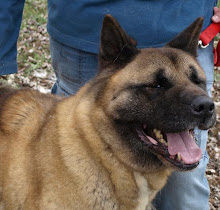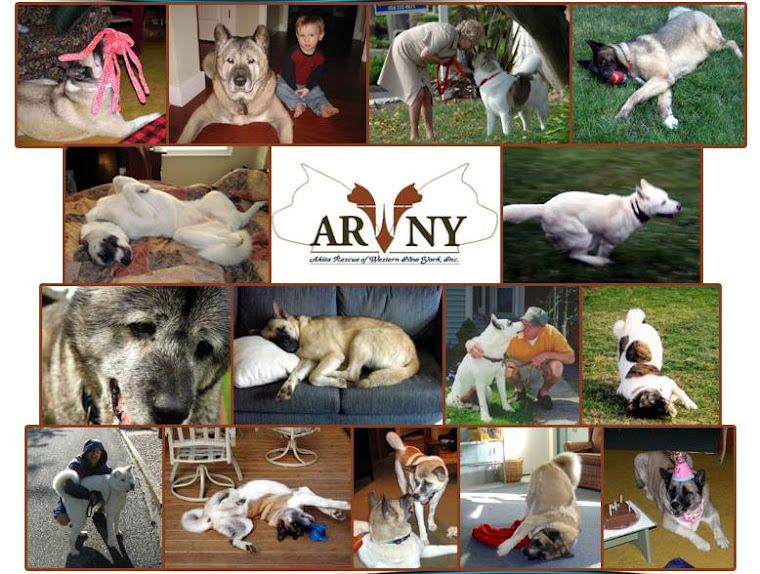
can be both a curse and a blessing. There are shelters we work with that we know are right-on when they call us about an Akita. If they tell us the Akita is lovely & sweet, we know it is. But then there are shelters that we can't trust, places that change personnel & "testers" too often and have methods of testing we can't rely on.
Take Matheo for instance. This pup came into the big NYC shelter as an owner surrender. That means, right off the bat, he's doomed, because owner surrenders can be euthanized as soon as they walk thru the door; unlike strays, they don't need to be held for any length of time so Matheo's time was extremely limited. The email that came that day about him from the shelter said he was 2+ yrs of age and food/toy possesive -- but not rawhide possesive. Hmmmmmmmmmmmm, that's a bit odd. Possession is possession and usually if an Akita is toy possessive, it follows they would also be rawhide possessive. That got us thinking...
Now, I'll be totally upfront. I will NOT deal with nor rehome any Akita who is truly food possessive or "possession" possessive. Akitas are a tricky breed -- intelligent enough to work around most issues & able to rethink most behaviorists' & trainers' methods. I've known of Akitas to hide these traits while in the shelters & in the care of some rescues until they get rehomed, where they grow comfortable enough to start showing their "true" nature when rehomed in a short period of time -- which is why I don't like any rescue Akita over the age of 6 months to go to a home unless its been in our care at least 3-4 weeks. I want to know everything about the Akita so we push to find out what triggers each Akita has & what will set that Akita off -- because placing a food aggressive Akita is a very dangerous thing to do for any breed rescue but especially with a breed as big & tough as an Akita. Akitas that guard their food bowls/toys/bones are often very upfront about it, snarling if you even walk in the room they are in or walking past them while they eat or chew on a bone. But there are Akitas who act perfectly normal until the day you forgot to add something to the bowl & go to reach for it, or the day the Akita grabs something from the trash or off a shelf or table and when you go to reach for it to ask for it back; you find yourself being badly bitten by an Akita you never knew had any possession issues. Its our job to find these things out before placement, so its why we work with them so much while in our care.
Sometimes, in other breeds, with enough re-training, you can break a dog of food aggression because other breeds have different personalities. In my experience however, you cannot break an Akita of true possession issues. If the Akita has true food/possession issues (and isn't a starved, hungry Akita from some puppymill situation where it never knew when it would get food again) then its a situation I'm not willing to handle. I won't put humans at risk for being attacked over a food bowl or toys on the ground or walking past a rawhide on the floor. There are some good training sites that help people to understand how to raise a puppy properly to prevent this issue
(http://www.veterinarypartner.com/Content.plx?P=A&C=157&A=1462&S=1)
but with an adult Akita, I'm not willing to deal with it because my experience has taught me that humans WILL get bitten, that the Akita will NOT get over it; so I'm not willing to see someone get bitten in trying to overcome these issues. You have to remember -- we are working to make each Akita in our care safe to be rehomed to the greater number of homes out there - humans tend to forget what we tell them, that they can't touch, pet, hug a dog while it has a bone or is eating among other things -- we can't take the risk that an Akita we rehome will end up in a place where it will react badly to the human error factor. So we must keep that human error factor in mind when deciding which Akitas are safe to rehome.
In the case of an Akita who comes in starving & is worried over its food bowl, that sometimes can work itself out; it all depends on the Akita itself, its past situation and what we know of its former living situation. Sometimes, an Akita that has been starved just has to learn food is always forthcoming which often happens very quickly - then the food issues become non-issues because the Akita is no longer starving, hungry or worried about where the next meal comes from. That I can work with, that I feel ok about handling; it shows itself quickly, within days, once the belly is always full and the Akita doesn't have to panic over where its next meal is coming from.
However, in Matheo's case, something about his shelter info just didn't sit right with us here at ARWNY. So Matt Dimon, Joann's wonderful experienced husband, offered to go to the shelter in NYC the next day to test this Akita himself - after all, Matt said, they 'shared a name' -- Matt is Matheo Dimon legally. If this Matheo the Akita showed any hint of possession issues with anything, Matt promised to help ease Matheo "Over the Rainbow Bridge" while at the shelter. What Matt found instead of food possession was an Akita in pain and a shelter system not set up to even notice or examine for pain before testing.
Matt went right into Matheo's run with him and found a very young male Akita with horrible skin issues under his coat -- oozing neck full of pus obviously from a collar left to embed into his skin & just recently removed. A shoulder open and raw, infected with likely staph or yeast infections. Underbelly raw, patches of skin showing thru the thin coat. Underweight at 90 lbs, Matheo wasn't the least bit food possessive or possesive of anything -- but he was against having some huge plastic hand poking his painful shoulder, pushing on his wounded neck. It had nothing to do with the food or the toys - it had everything to do with him hurting.
The 'tester' at this shelter admitted to Matt she didn't get close enough to this Akita to even see this as she was "afraid" of Akitas -- probably all big dogs but definately Akitas. So Matheo was labeled dangerous and not able to be rehomed. He was essentially condemned to death. He was also much younger than his shelter sheet said; within minutes he was looking to Matt for attention - probably the first positive attention he had ever had.
Luckily this shelter was close enough that we could personally evalute Matheo. But what happens when we aren't close enough and must trust a shelter to give us an honest evalution? We can't pick up the phone and call people asking them to go into a shelter near them and try to provoke an Akita to attack them over food. Yet that's what we need to know before-hand -before we take on an Akita whose personality might be in question, we need to know before we make all the effort to bring an Akita into our care in rescue from a long distance.
So what can be done to prevent mistakes like this from happening to other Akitas? Well, as many have discussed over and over -- an entire rehab of the shelter system needs to happen to change the "big picture" overall. Qualified trainers, with no breed-specific agendas of their own, need to be hired and do proper tests - not prod and poke some dog while he's eating, but actually work with the dogs to see if they are food possessive and not just reacting to some foreign plastic object hitting them on the neck, head or shoulders. Shelters need to rethink their personality assessments -- there are often underlying reasons of health that cause some dogs to react negatively to various scenerios. Health should be a primary consideration for any dog coming into the shelter system. Dogs coming into shelters are scared, stressed & terrified -- testing them the day they show up doesn't work and often this standarized test most shelters use doesn't work the same with an Akita as it will a Bichon, for example. Giving them time is the better indicator. I know shelters are overloaded, I realize there often isn't time so don't think I have blinders on or feel this is an easy fix. Its why I say - there needs to be an entire overhaul of the shelter system. We are failing the pets every day and it has to be changed. I just wish every shelter would get on the same page so we could all work together and help the animals. This is a subject for another day because its too big and too overwhelming for this discussion here.....
In addition, to prevent problems -- owners need to learn how to properly raise a puppy so it doesn't become food possessive. Owners often cause this in their puppies, then dump them when they get too big & the owners become afraid of them. So we need owners willing to raise their puppies right or we will keep on seeing these issues (along with a myriad of others!).
Rescues also need to work closely with each dog in their care to test for things like this before they rehome any dog. Taking any dog from a shelter one day and rehoming it the same day or the next day isn't doing rescue -- there are words for that but its not RESCUE. Rescue means we evaluate, work with, vet, properly temperament test and strategize over what home is best for this particular dog -- not just any home for any dog, but the right home for each individual dog in our care. That is what rescue should be about. Unfortunately its not always about that. But that's a subject for another day also.
Today -- I am just happy that Matheo has been saved and will be made healthy with ARWNY so he can grow up into the wonderful Akita we know he is. Hats off to the collective effort that made this happen so Matheo didn't die alone, scared and stressed in the shelter due to a poor shelter assessment.
***NEW NOTE: Matheo has been adopted by a police detective who adores him -- Matheo has shown himself to be a perfectly housebroken, well-behaved boy who has done well in his new home. His adopter could not be happier. ARWNY could not be happier. Thank heavens we did NOT take his initial evaluation at face-value!!***




No comments:
Post a Comment